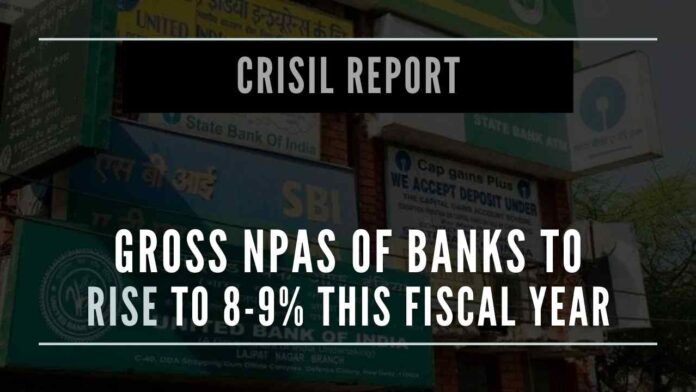
Crisil report: Bad loans of India’s banks to rise to 8-9% in current financial year
The latest report by rating agency Crisil shows a grim picture of the growing bad loans of Indian banks. Gross non-performing assets (NPAs) of banks are expected to increase to 8-9 percent in the current financial year, credit rating agency Crisil said in its latest report released on Tuesday. This will be well below the peak of 11.2 percent seen at the end of fiscal 2018.
According to the reputed rating agency Crisil, the COVID-19 relief measures such as the restructuring dispensation, and the Emergency Credit Line Guarantee Scheme (ECLGS) will help limit the rise in banks gross NPAs. With around 2 percent of bank credit expected under restructuring by the end of this fiscal, stressed assets comprising of gross NPAs and loan book under restructuring should touch 10-11 percent this fiscal year, it said.
“The retail and MSME segments, which together form close to 40 percent of bank credit, are expected to see higher accretion of NPAs and stressed assets this time around,” the agency’s senior director and deputy chief ratings officer Krishnan Sitaraman said in the report. Stressed assets in these two segments are seen rising to 4-5 percent and 17-18 percent, respectively, by this fiscal end, he said.
The agency said operationalization of the National Asset Reconstruction Company Ltd (NARCL) by the end of this fiscal and the expected first-round sale of Rs.90,000 crore NPAs could lead to lower reported gross NPAs. The report expects the corporate segment to be far more resilient. A large part of the stress in the corporate portfolio had already been recognized during the asset quality review initiated five years ago.
“That, coupled with the secular deleveraging trend, has strengthened the balance sheets of corporates, and enabled them to tide over the pandemic relatively unscathed compared with retail and MSME borrowers,” it said. This is evident from the restructuring of only around 1 percent in the segment, the report said. It expects corporate stressed assets to remain range-bound at 9-10 percent this fiscal.
The rural segment, which was hit harder during the second wave of the pandemic, has also seen a strong recovery and, therefore, stressed assets in the agriculture segment are expected to remain relatively stable. The agency’s director Subha Sri Narayanan said while the performance of the restructured portfolio will definitely need close monitoring, the slippages from the restructured book are expected to be lower this time.
These estimates are predicated on a base-case scenario of 9.5 percent GDP growth this fiscal and continued improvement in corporate credit quality, the rating agency said. A virulent third wave and significant deceleration in demand growth could pose significant downside risks to these estimates, said the Crisil report.
Recently BJP leader Subramanian Swamy approached the Supreme Court seeking the need for guidelines to prevent the huge bad loans and NPA by Corporate Houses. His petition sought a single clearance window of banking consortium for the loans above Rs.100 crore and a ban of pledging of shares by certain corporate houses. The apex court asked Subramanian Swamy to present his suggestions before the Reserve Bank of India.[1]
References:
[1] Supreme Court asks Subramanian Swamy to file his suggestions to prevent growing NPA of banks to RBI. Says guidelines on NPA is a policy matter. – Oct 17, 2021, PGurus.com
PGurus is now on Telegram. Click here to join our channel and stay updated with all the latest news and views
For all the latest updates, download PGurus App.
- Supreme Court rejects plea to tally all VVPAT slips with EVM votes; says ‘no going back to paper ballot’ - April 26, 2024
- US report citing human rights violations is deeply biased: India - April 25, 2024
- Kotak Mahindra Bank shares tank 13%. Market Cap erodes by Rs.37,721 cr post-RBI action - April 25, 2024










